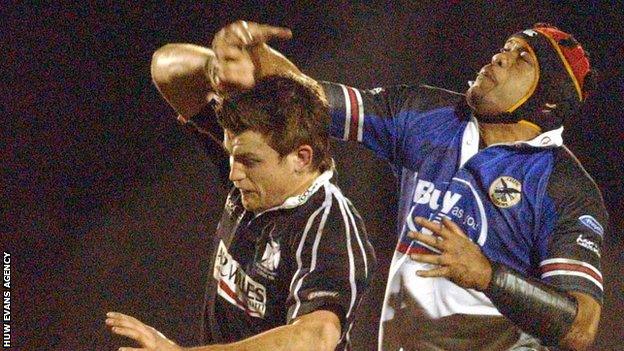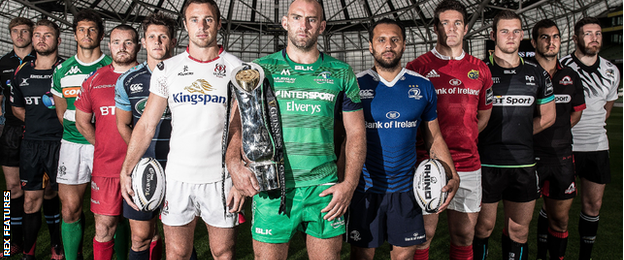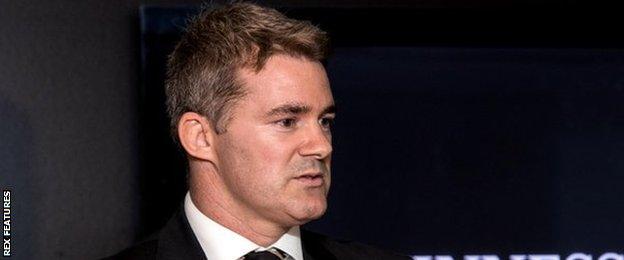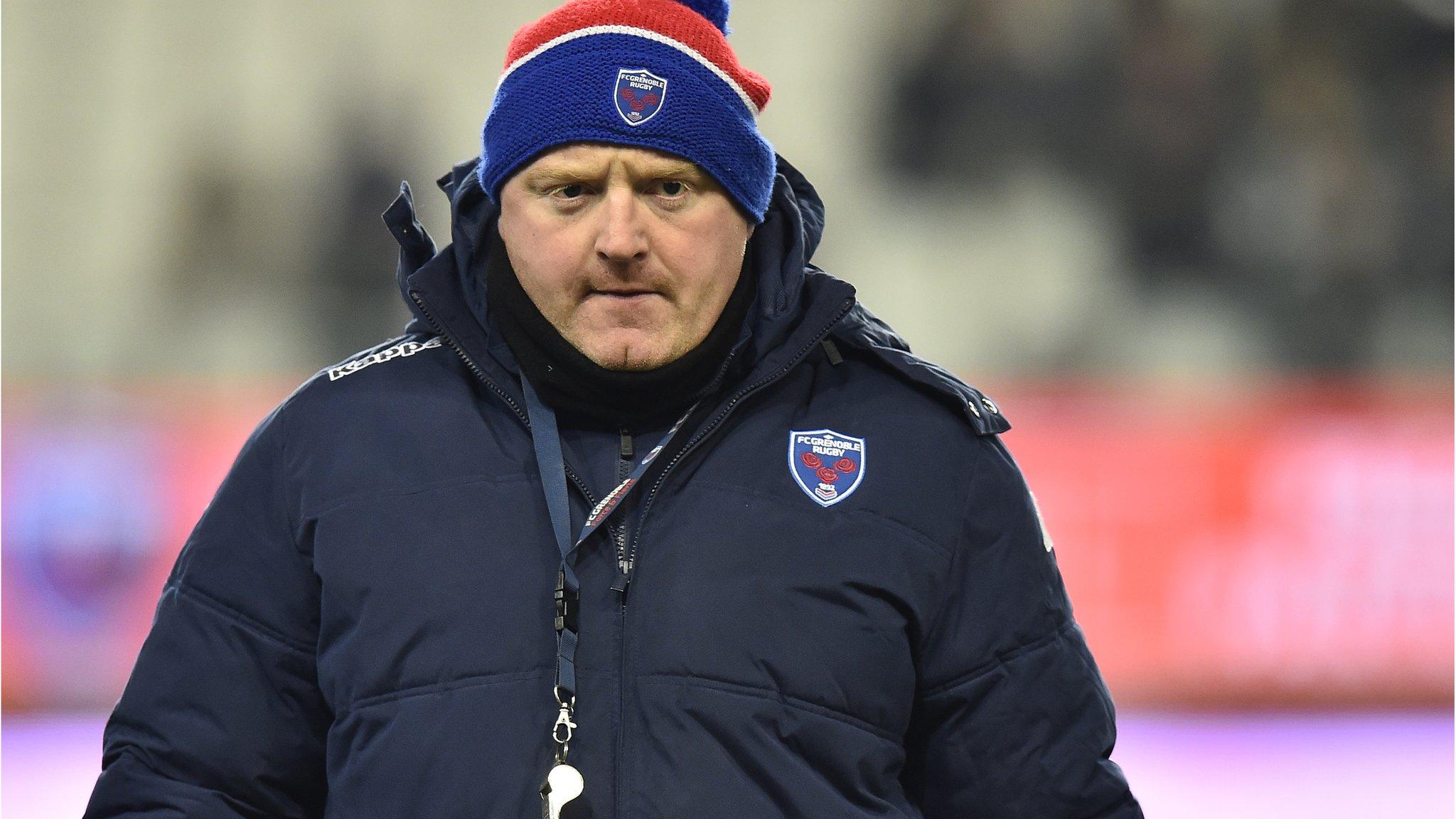Pro12: Competition facing an uncertain future in current guise
- Published
- comments

The Scarlets are the current Pro12 champions
It would appear that the only certainty on the future of the Pro12 is that the competition faces an uncertain future.
For so long a poor relation in terms of finances, attendances and prestige compared to the English Premiership or France's Top 14, it would appear change is again coming to the competition.
The how, the why and even the where is very much up for discussion, but it seems likely that the Pro12 will not continue in its current guise beyond 2017-18.
So what next for the premier domestic rugby competition for teams from Wales, Scotland, Ireland and Italy?
Will a league once designed for the Celtic nations soon be a competition throughout Europe? Will it be a worldwide league?
Do not count it out.

Neath-Swansea Ospreys v Celtic Warriors: Ospreys' James Bater and Warriors' Maama Molitika compete during a line out. The Warriors are now defunct and the Ospreys rebranded
The history
Originally designed as a Celtic competition, the event formerly known as the Celtic League is already very different to the one that was launched in 2001.
The establishment of the competition led to five professional regions being created in Wales for the 2003 season, with Newport Gwent Dragons, Cardiff Blues, Llanelli Scarlets and Neath-Swansea Ospreys joined by the now defunct Celtic Warriors, competing with Irish regions Connacht, Leinster, Munster and Ulster.
Scottish sides Edinburgh Reivers, Glasgow and Scottish Borders, completed the line-up.
Unfortunately, the launch of the Welsh regions coincided with both the 2003 World Cup and then the 2004 Six Nations, meaning many top players missed much of the season.
That, arguably, is an issue the Pro12 has never fully been able to address, but it did not help matters that season, though it was not half as big a blow as when the Celtic Warriors went into liquidation 12 months later after just a single season in operation.
At the end of the 2007-8 season, 11 became 10 when Scottish Borders were disbanded and Glasgow moved into their Firhill home.
The division badly needed reinvigoration and that arrived with yet more change, with the tournament revamped and expanded in 2010 to include Italian sides Treviso and Aironi.
Aironi lasted two seasons before they left the set-up, replaced by Zebre who have completed the 12-team tournament since 2012.
However, the 2017-18 season seems likely to be the last Pro12 season under the current guise.

Pro12 players at the 2016-17 season launch in Dublin
The rumours
Plans to expand and revamp the Pro12 seem to present themselves almost on a daily basis now, with sides from around the world being linked with the competition, while rumours persist about the prospect of the Italian sides being removed.
Dual-code legend Jonathan Davies has been among the critics who believe the Pro12 could benefit by kicking out the Italian sides.
There have been suggestions of a side from Georgia being added to the set-up, while the German Rugby Federation is also understood to have held talks with Pro12 chiefs.
BBC Scotland reported earlier this month that South African side the Cheetahs have been invited to join the competition, while Pro12 Chief Executive Officer Martin Anayi has already confirmed discussions that could see north American involvement.
Houston and Vancouver have previously been earmarked as possible host cities.
The southern hemisphere Super Rugby tournament is to be reduced from 18 to 15 teams from next year, with South Africa losing two sides and Australia one, which is why South African teams are also being linked with a switch to the Pro12.
SA Rugby is yet to announce which two teams will be ditched.
Previously, London Welsh and London Scottish were also suggested as potential Pro12 additions.
Any additional sides joining the division could also lead to a revamped system, whereby the Pro12 switches to a conference system.
That could enable more matches being played outside Test windows, meaning more star players being available.

Martin Anayi was appointed managing director of the Pro12 in August 2015
The future
Anayi says that while following an English or French model is unrealistic, the competition will continue to seek more lucrative markets.
He says club rugby globally is on an upward curve, and feels the Pro12 is well placed to capitalise on this growth.
"We aren't going to be able to rely on one big domestic TV deal, because we purely don't have the same chimney stacks as in England and France," Anayi told BBC Sport in 2016.
"So we have to look at new primary markets, make sure we deliver full attendances and do the things we can do to make a change.
"We don't see investment as the be-all and end-all of rugby generally. The market forces do not allow for the kind of spend they are spending (in England and France)."
However, the immediate focus will be on increasing the spotlight on a league that produced more players - 107 - at the last World Cup than any other rugby competition.
It is what Anayi calls the competition's greatest strength being turned into its greatest weakness.
"We have more international players than any other competition, but we play games in international windows," he said. "It's self-defeating."
In terms of next season, a tweak to the scheduling might have to suffice, but it is increasingly clear that the Pro12 is unlikely to continue in its current format in the longer term.
- Published12 June 2017
